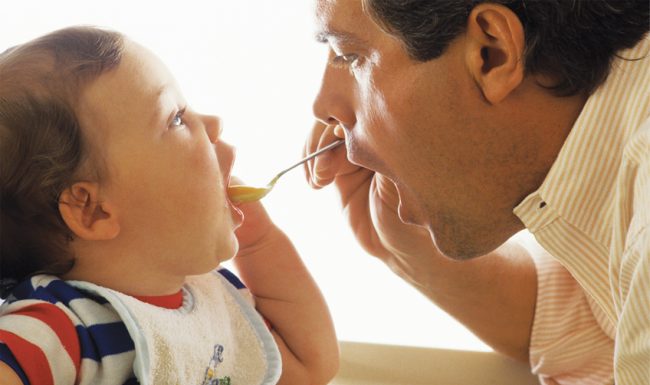Starting to eat solid food is a big change for your baby. They experience new tastes and textures, and learn to do new things with their mouth and hands. Your baby should have only breastmilk or formula until they are about 6 months old. After that, it is still their main food, but you can start to give them soft cereal or mashed food too.

Your Baby’s First Solid Food (6 to 8 months)
When your baby is ready, start slowly, with very small spoonfuls of mashed food. At first your baby may eat only one or two teaspoons of the new food. You can start and finish with breastmilk or formula, so your baby gets what they are used to and gets enough to eat. You can also mix baby cereal with breastmilk or formula. Your baby still needs breastmilk or formula several times a day.
Many babies have baby cereal first, but you can also give them mashed, cooked vegetables, fruit or meat any time they are ready for solid food. Within two to three months, you can offer your baby a wide variety of mashed foods. Talk to your baby’s healthcare provider about starting peanut puffs or smooth peanut butter, if you haven’t already.
Signs That Your Baby Is Ready
You can try solid food when your baby:
- Can hold their head up consistently.
- Can sit up with support.
- Is double their birth weight and weighs at least 13 pounds.
- Can swallow food, instead of spitting it out.
- Watches you eat and opens their mouth or reaches for the food.
When Are Babies Full?
Your baby will let you know when they have had enough food. They may fuss or push the spoon away. When this happens, let your baby stop eating.

Finger Foods, Cups and Spoons (9 to 12 months)
Your baby can begin to eat foods that are soft and easy to swallow without chewing. This can include cooked vegetables and fruit, small pieces of tofu or cheese, and finely chopped meat, fish or beans. Over time, offer them lots of different kinds of foods.
Your baby still needs breast milk or formula. Babies should not have cow’s or goat’s milk before they are a year old.
Be patient as your baby learns to feed themself. Let them be at the table during family mealtimes, and accept that being messy is part of learning how to eat.
Weaning
Gradually replacing breastmilk or formula with other foods is known as weaning. You and your baby can choose when and how to make this change.
From breastfeeding
Try to breastfeed for at least a year. To taper off, try breastfeeding only when your toddler is interested. It may be easiest to stop midday breastfeedings first.
From bottle feeding
Between 12 and 18 months your baby should stop drinking from a bottle. To help them be ready, offer formula, breastmilk or water in a sippy cup at about 6 months. Babies should not carry bottles around or have bottles in bed.
Healthy Drinks
After weaning, babies and young children should drink plain water or milk. These are the healthiest drinks for children of all ages.
Feeding Your Baby Safely
- Always wash your hands before filling a bottle or giving your baby food.
- Test how warm food or liquid is before you give it to your baby.
- Wash and cook fruits and vegetables. Mashed bananas do not need to be cooked.
- Don’t give your baby cereal in a baby bottle.
- Do not give honey to babies younger than 1 year.
How to Prevent Choking on Food
- Watch your baby the whole time that they are eating. If they are choking, they cannot make noise to let you know.
- Cut food into half-inch pieces. Cut round foods like grapes, hot dogs and cherry tomatoes into strips. Remove bones, seeds and pits.
- Babies cannot safely chew and swallow tough foods like dried fruit or large pieces of meat.
- Babies cannot safely chew and swallow hard foods like raw carrots, nuts and popcorn.
More Ways to Find Help
Feeding Matters — Help with ongoing feeding problems.
WIC — Food coupons and classes on healthy eating.
The First Things First Parent Kit was developed in partnership with Health Research for Action/UC Berkeley. © 2023 The Regents of the University of California. Additional video, graphic and other content © 2023 First Things First. All rights reserved.

